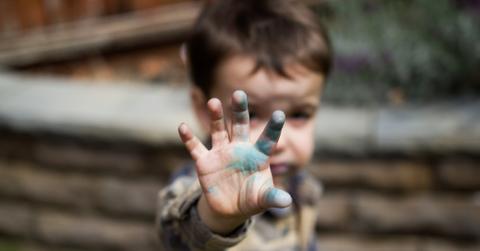
4 Positive Parenting Strategies That Will Help You Keep Your Cool & Stay Connected To Your Child
If you're a parent, you've almost certainly heard the phrase "the terrible twos." And if you're a first-time parent, chances are you've been warned about how awful the toddler years will be. One of your best lines of defense is to equip your parenting toolbox with strategies that are both positive and effective.
But first, what do these self-proclaimed parenting gurus mean when they say "terrible twos"?
The time period "refers to a normal stage in a child's development in which a toddler can regularly bounce between reliance on adults and a newly burgeoning desire for independence. The symptoms vary between children but can include frequent mood changes and temper tantrums," pediatrician Vincent Lannelli explains.
While it is true that the toddler stage of childhood comes with challenges that will sometimes leave you feeling exhausted, practicing positive parenting will certainly help you keep your cool with your kiddos.
So, what can you do to manage the toddler years?
Keep reading for four positive parenting strategies you can use with your child.
Choose Not To Battle
When your 2-year-old first screams "NO!" at you, you might be tempted to lose your cool and draw battle lines — unless you are prepared for the behavior. Spend some time pondering why the little person you are parenting might not want to listen to you and put yourself in your child's shoes. As a toddler, you are pretty powerless — and saying no makes you feel less so. Child psychologist John Sargent explains that "kids this age are realizing that they can assert themselves, and arguing with you is one way they gain confidence."
Instead of letting kids rule the household, you can implement a number positive parenting techniques. First of all, empathize with your child and verbalize what they are trying to say.
When your child screams "no" when leaving an activity, you can say, "You don't want to go bye, bye. You're sad! You were having so much fun."
When your toddler says no, it is because they are "expressing an opinion (sometimes with tears or screams instead of words), it may be different from yours, but that doesn’t make it less important," parenting coach Nicole Schwarz says.
Another idea is to remember that even though you are empathizing with your screaming child, you don't need to give into their demands — you are still the parent.
Finally, you can avoid battles and help your child feel powerful by offering choices you are OK with. For example, say, "It's time to go bye, bye. Do you want to hold your teddy bear or your doll?" Psychologist and mom Alana describes this strategy as giving "two options with the same outcome."
Play With Your Child
Playtime is important because it fosters connection. According to Work At Home Mom, when you interact with your children, it helps you understand their "interests, feelings and thoughts," and it assists you when communicating with your child. You'll even learn how your child "reacts to success, failures and obstacles."
As mom and author Kirsten Schuder says, play "goes a long way to developing a relationship with your children based on trust, an important part of positive parenting."
Give Lots Of Hugs & Snuggles
According to KinderCare, "Hugs actually help us form lasting bonds with our children — which is why we definitely recommend a daily dose of closeness." One reason for this is that hugs give both the receiver and the recipient a rush of oxytocin.
"Released into our brains under the right circumstances, oxytocin has the power to regulate our emotional responses and pro-social behaviors, including trust, empathy, gazing, positive memories, processing of bonding cues, and positive communication," wellness writer Alexandra Owens says of oxytocin's effect.
Equip Your Toddler With Good Communication Tools
Most parenting experts agree that another reason toddlers try to fight parents is because they have less communication skills than older children do, as the younger ones don't always know how to explain what they are feeling.
The child development website Zero to Three lists the following ways you can teach your toddler to communicate better: "talk with and listen to your child," "help your child build on their language skills," "teach your child about non-verbal communication," "respect and recognize your child's feelings" and "help your child develop a 'feelings' vocabulary."

Your child only has one go at toddlerhood. So, make sure to use these tools whenever needed. As Maya Angelou said, “I’ve learned that people will forget what you said, people will forget what you did, but people will never forget how you made them feel.”
